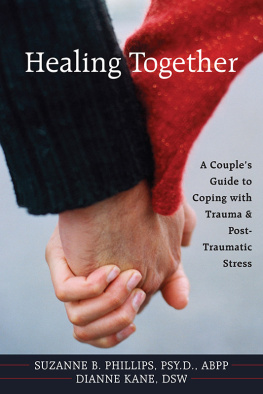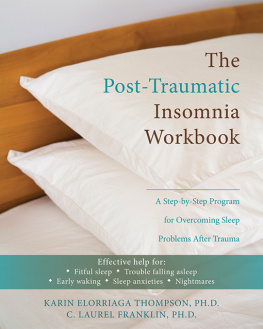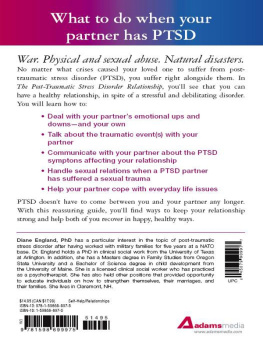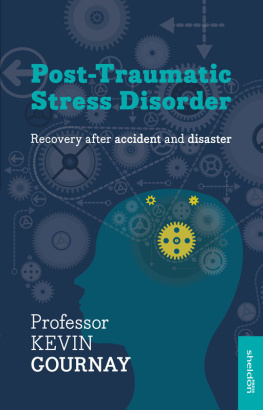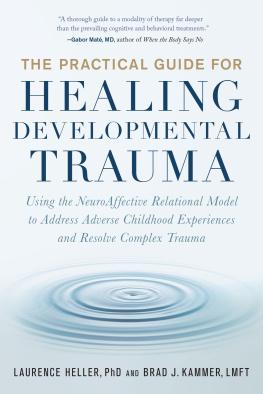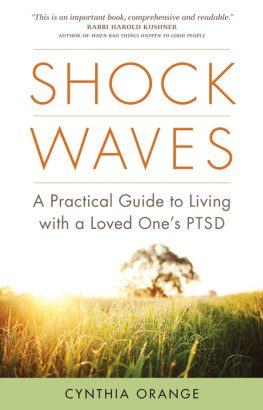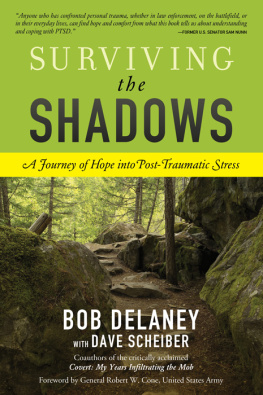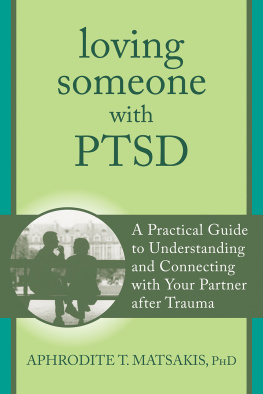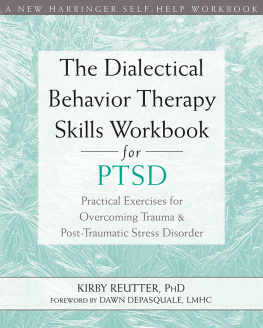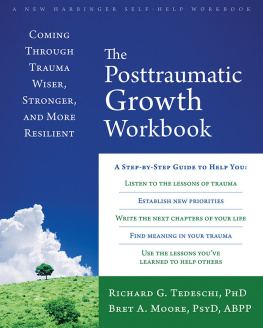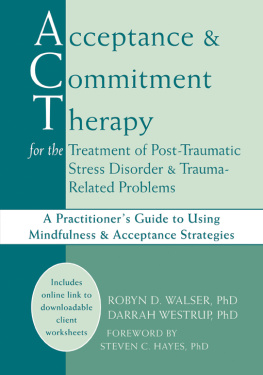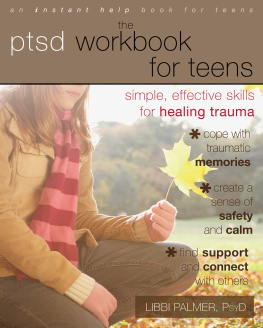Something Traumatic Has Happened
Since we cannot change reality, let us change the eyes which see reality.
Nikos Kazantzakis (2003)
If you are reading this book, then something traumatic has happened in your life. It may have been the two minutes you could never prepare forthe accident, the hurricane, the sudden death of a loved one, an unexpected military deployment, or a childbirth that has taken an extraordinary physical and emotional toll. This chapter begins your journey toward recovery. It is based on the recognition that trauma will affect both partners in a relationship, and that any traumatic experience will also affect the relationship you share. We are talking about more than secondary traumatic stress (the theory that close connection with a traumatized person can cause a partner to experience the same symptoms as the traumatized partner; Arzi, Solomon, and Dekel 2000; Figley 1983). In this book, we are talking about the fact that partners may react to trauma in similar or different ways, butby virtue of their conscious and unconscious connectionthe relationship they share, the we they experience, will inevitably change. The nature of this change is complex but it need not be destructive. Above and beyond the particular situation you and your partner are facing, know that your relationship gives both of you the most important resource for trauma recovery: human connection. In this chapter we offer you the first step in using the potential of your relationship. We will clarify what trauma is and its impact on relationships in a way that helps you understand and deal with your own reactions, the reactions of your partner, and the dynamics that unfold between you.
What Is Trauma?
In medical terms, a trauma is defined as a serious injury or shock to the body that might result from violence or an accident. From a psychological perspective it is defined as an event that has the capacity to provoke fear, helplessness, or horror in response to the threat of injury or death (American Psychiatric Association 2000). In broader terms, a traumatic event is one of extreme stress that outstrips a persons ability to cope. In most cases it is an unimaginable event and out of the range of what you expected to handle. You were not supposed to be wounded in combat, lose a baby, watch your home be destroyed by fire, or be diagnosed with serious illness. Trauma affects you emotionally, cognitively, and physically. It violates your belief in yourself, your judgment, your body, other people, even higher powers.
Trauma Involves Loss
Trauma always involves loss. Whether a traumatic event has threatened your life, robbed you of someone you love, or destroyed your community, it deprives yousuddenly and even violentlyof what you had. It destroys the sense of safety, predictability, and justice that you assumed and expected in your life. The reality of such a loss is often overshadowed by the physical and psychological impact of the trauma or the circumstances of the trauma itself. This in turn can interfere with feeling entitled to or being able to grieve. Sometimes the loss is so overwhelmingly clear that for a time it is too much to face. Sometimes a loss is ambiguous, as in an unclear medical prognosis or the unexplained absence of a loved one. In any case, sadness and grief are human and inevitable in the experience of trauma.
Trauma Affects Relationships
When people fall in love and marry or enter into a committed relationship, the relationship gives new meaning to definitions of self, other, and the rest of the world. As part of a we, each person in a healthy relationship feels connected, valued, loved, and desired. As a result of the relationship each feels safe, empowered, and happy. Something wonderful has happened! Notwithstanding the ebb and flow of time, the way they fight, the passion they show, the bills they pay, the number of children they have, or the number of years that pass in stress or bliss, most young and old couples develop a defined and familiar experience of each other. They share a conscious and unconscious bond. They play certain roles in each others lives. She makes him laugh, he confides in her, she worries too much, he silently supports, she reminds him of his talents, he makes her feel desired, he owns the remote, and she buys the furniture.
Trauma disrupts the patterns of attachment and care that a couple has developed. Trauma puts up a wall that for a time locks a couple out of their familiar world and leaves them frozen in the traumatic event. Suddenly there is no past, and the future feels impossible. What they believed before and their dreams about the future no longer feel relevant, much less possible.
How Does Trauma Play Out in a Relationship?
Following are a few examples of how trauma can disrupt the familiar world of a healthy relationship:
After her boyfriend, a policeman, was hurt in the line of duty, Mary couldnt just go to sleep and expect that he would be safe. Every night the worry crept in.
After breast cancer, Sue stopped believing she could ever be desirable again and avoided her husband, Carl.
After his brother was killed in Iraq, Mike pulled back on the sense of humor that had been so basic to the shared connection between him and his fiance, Jill.
Patty and Sean began to doubt that they could rebuild their house, much less their life, after the hurricanehow can you feel capable of anything if you cant prevent bad things from happening?
One expert suggests that a person who has been traumatized has been wounded by reality. There is a disruption in the core self, quite literally fixing it in place, changing biology and psychic experience (Boulanger 2002, 45, 54). This translates to a loss of the familiar sense of self, belief in ones abilities, and trust in ones judgment. It makes sense that, if you are suddenly uncertain regarding what has happened and who you are, you will be uncertain of your partner and how he or she will respond to you. Other experts (McFarlane and Girolamo 1996) suggest that traumatic events violate our existing ways of making sense of our reactions, change our perceptions of other peoples behavior, and alter the framework we use for interacting with the world. Accordingly, when your view of the world and your perception of others change, your familiar expectations and patterns as a couple are shaken. For a time you may both feel lost. Working together, however, you can regain your bond and the patterns between you may actually become stronger.
The Usual Responses to Trauma
Most people respond to catastrophic and traumatic events with distress. It is a normal reaction to the horror, helplessness, and fear that make up the crucial components of a traumatic experience (McFarlane and Yehuda 1996). The symptoms of distress reflect the fact that trauma jolts the mind and bodywe are wired to respond to trauma physically, neurochemically, and emotionally. The distress symptoms, which will be defined next, include intrusion or reexperiencing; hyperarousal; and constriction, numbing, and avoidance (Herman 1997). Often appearing within the first days after a trauma, these symptoms, although intense at first, generally subside with time for many survivors. As will be discussed at a later point, if these symptoms become a persistent pattern lasting more than one month they are described as post-traumatic stress disorder (PTSD). However, even when the disorder does not occur, one or more of these symptoms can cause distress to an individual and his or her partner. Understanding these symptoms of trauma can be a first step in managing their impact on your relationship.
Intrusion or Reexperiencing
Intrusion or reexperiencing is like being caught in an indelible imprint of the traumatic moment. In some cases intrusive symptoms may appear within the first forty-eight hours after trauma (Shalev 1992). It is as if the hospital scene, the oncoming car, or the explosion were being played over and over again. Such symptoms translate into nightmares, flashbacks, fear of going to sleep, and traumatic memories. Although such intrusive symptoms are frightening and bewildering, it is worth underscoring that they are actually functional. They are the mind and bodys way of

